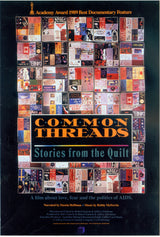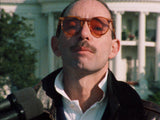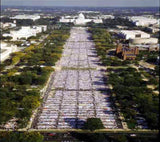Milestone Films
Common Threads: Stories from the Quilt
Preserved by the Academy Film Archive, Milestone Film & Video and the Outfest UCLA Legacy Project, a partnership between Outfest and UCLA Film & Television Archive.
1989 Academy Award for Best Documentary Feature
Interfilm Award at the 1990 Berlin International Film Festival
GLAAD Media Award Outstanding TV Documentary 1990
Peabody Award 1990
“History will record that in the last quarter of the 20th century a new and deadly virus emerged and that the one nation on earth with the resources, knowledge, and institutions to respond to the epidemic failed to do so. History will further record that our nation’s failure was based on ignorance, prejudice, greed and fear not in the heartlands of America but within the oval office and the halls of Congress.” — Cleve Jones, The NAMES Project AIDS Memorial Quilt
A tremendous, handmade monument to lives lost to AIDS, the NAMES Project AIDS Memorial Quilt demonstrated that grief and activism together could manifest a powerful symbol of resilience. Winner of the 1989 Academy Award for Best Documentary Feature, this moving film explores the human stories obscured by statistics, examining the cross-section of identities affected by HIV/AIDS, as well as efforts to combat the stigma, misinformation, and political obstruction that deepened the crisis.
The AIDS Quilt was started by a group of volunteers called the NAMES Project in a San Francisco storefront in July 1987. By the spring of 1988, the Quilt had grown to include 3,000 panels, each a handmade memorial to an AIDS victim. Producer Bill Couturie saw the proposed documentary as “a way to make a film that would be both hard-hitting and affecting… I thought from the start the film itself should be a patchwork quilt. America is a patchwork quilt. People with AIDS are a patchwork quilt. The virus is indiscriminate. So people who otherwise would never have been connected are bound together.”
In a case of parallel evolution, filmmakers Rob Epstein and Jeffrey Friedman had felt similarly moved when they saw the Quilt displayed for the first time in Washington in October 1987. “Up to that point,” Epstein said, “nobody had seen the Quilt in its entirety, and the effect was, needless to say, awesome. We were there at dawn and we were standing around this huge canvas grid, and the names of the dead were being read. And by the time the Quilt was fully unfolded several hours later there was something before you that was so beautiful and yet so horrifying. Entering this Quilt, entering this weave of lives, interacting with the other people there, made you feel the weight of this epidemic. We were just stunned and awed by the scale of the Quilt and the intimacy of it.” Epstein recalls, “I’d never seen anything like that. We were with our friend [and fellow filmmaker] Peter Adair and he said, ‘Somebody has to make a film about this.’ Jeffrey and I ran with that and ran back to San Francisco and met with the NAMES Project folks and started delving into all the material.”
The Quilt that Epstein and Friedman saw in Washington, DC in 1987 was composed of 1,920 panels. When the pair filmed its unfolding in October 1988 for Common Threads, the AIDS Quilt had grown to 8,288 individual handmade panels. The documentary won the Oscar® for Best Documentary, but more importantly, has remained an emotional, vibrant story of a tremendous tragedy that evolved into one of the great protest movements in American history.
United States. 1989. 79 minutes. 16mm. Color. In English. Winner: 1989Academy Award for Best Documentary Feature. Interfilm Award at the 1990 Berlin International Film Festival. GLAAD Media Award Outstanding TV Documentary 1990. Peabody Award 1990. A Telling Pictures and The Couturie Company Production. Directed and Edited by Robert Epstein and Jeffrey Friedman. Produced by Bill Couturie, Robert Epstein, and Jeffrey Friedman. Directors of Photography: Dyanna Taylor and Jean de Segonzac. Additional Cinematography: Edward Lachman. Narrated by Dustin Hoffman. Music composed by Bobby McFerrin. Music performed by Bobby McFerrin and Voicestra. Writers: Robert Epstein, Jeffrey Friedman, and Cindy Ruskin
An Explanation of Home, Classroom, and Public Performance Rights
Through our distribution partner, Kino Lorber, Milestone provides a variety of licensing to suit all needs. Our standard institutional licensing packages are designed to provide colleges, universities and qualified non-profits with the best value for multiple uses, and our one-time community screening licenses allow any organization to exhibit high-quality films for a reasonable fee. Please note that all licensing carries restrictions on audience numbers and/or geographic range.
STANDARD INSTITUTIONAL LICENSING
- CLASSROOM RIGHTS allow unlimited use in face-to-face classroom situations for the life of the media, restricted to a single campus or location. Please note that this license doesn't include public screenings or digital transmission of any kind.
- PUBLIC PERFORMANCE RIGHTS (PPR) allow educational and nonprofit groups to exhibit our films to groups of 100 or fewer individuals where admission is not charged. The term of the public performance license is for the life of the DVD. However, if you intend to charge admission, expect an audience over 100, or publicly advertise the screening, then we ask that you contact us regarding an exhibition fee. Films purchased without Public Performance Rights are restricted for individual viewing or face-to-face teaching in the classroom only.
- DIGITAL SITE LICENSES (DSL) allow colleges, universities and nonprofits to locally host and stream to their community on a closed, password-protected system for the life of the digital file.
- K-12 PPR comes with limited performance rights so films can be shown in classrooms, at PTA meetings, during after school programs, and transmitted on a closed-circuit system within a K-12 school building or on a single campus.
For all educational licenses and screenings, please Estelle Grosso, Director of Educational and Non-Theatrical Sales & Distribution at Kino Lorber (Milestone’s distribution partner) at: egrosso@kinolorber.com.
The purchase of DVDs, DVD-Rs, and Blu-rays at the institutional rate by anyone outside of a North American non-profit educational institution does not grant rights for public performance or streaming.
Any continuous or loop screenings as part of a museum exhibition must also be licensed separately. Inquiries must be negotiated directly by emailing egrosso@kinolorber.com.
Information for Exhibitors Screening DCPs and Film Prints
All bookings must be made by email correspondence with George Schmalz, Director of Theatrical Sales at Kino Lorber (Milestone’s distribution partner) at: gschmalz@kinolorber.com to negotiate terms and insure a screening copy is available. An order is only finalized when Kino Lorber sends written confirmation.
DCPs are shipped insured for their cost via Federal Express or UPS and must be returned the same way or by an equivalent method. Shipping and handling charges for outgoing DCPs appear on your invoice. The immediate return or transshipment (as directed) of all DCPs is your responsibility.
DCPs should be returned to:
Milestone Film & Video
38 George Street
Harrington Park, New Jersey 07640-0128
United States
35mm and 16mm prints are shipped insured for their cost via Federal Express or UPS and must be returned the same way or by an equivalent method. Please do not ship prints back via US Mail. Exhibitor pays to ship both ways. Shipping and handling charges for outgoing prints appear on your invoice. The immediate return of all prints is your responsibility.
Prints should be returned insured for $1,000 to:
Iron Mountain
Attn: Milestone Account
235 Main Street
Little Falls, NJ 07424
201.944.3700
For public screenings, advertising materials can be requested by contacting jhertzberg@kinolorber.com.
Milestone is the exclusive licensor for all the titles in this catalog, all of which are available from Milestone’s distribution partner Kino Lorber. in their complete versions.





